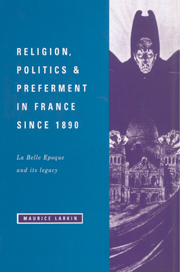Book contents
- Frontmatter
- Contents
- Preface
- Part 1 As it was: Catholics and the Republic, 1890–1914
- 1 Ralliés and dérailleurs: Catholics and subversion
- 2 Le sabre et le goupillon: Catholics and the Army
- 3 Raison d'état, raison d'église: the Roman dimension
- Part 2 As it was: Catholics and state employment, 1890–1914
- Part 3 As it became, 1914–1994
- Map: Religious observance in France, c. 1960.
- Notes
- Sources
- Index
1 - Ralliés and dérailleurs: Catholics and subversion
Published online by Cambridge University Press: 27 January 2010
- Frontmatter
- Contents
- Preface
- Part 1 As it was: Catholics and the Republic, 1890–1914
- 1 Ralliés and dérailleurs: Catholics and subversion
- 2 Le sabre et le goupillon: Catholics and the Army
- 3 Raison d'état, raison d'église: the Roman dimension
- Part 2 As it was: Catholics and state employment, 1890–1914
- Part 3 As it became, 1914–1994
- Map: Religious observance in France, c. 1960.
- Notes
- Sources
- Index
Summary
‘Les deux France’
When Disraeli spoke of Britain as ‘two nations’, the division he saw was primarily socio-economic. When French writers spoke of ‘les deux France’, the division they had in mind was primarily political. On the one side there was democratic France, heir to the Revolution and optimistic in its faith in the power of reason and knowledge to create a better future. On the other there was conservative France, sceptical about mankind's capacity for progress unless guided by its tried-and-true mentors – the ruling elites whose experience, education and material stake in the country guaranteed stability and common sense, and whose entitlement to lead the nation was buttressed by the legacy of Church and monarchy. If French Socialists were more inclined to share Disraeli's socioeconomic vision of the divided nation, even they frequently resorted to the political imagery of ‘les deux France’. For them, as for Clemenceau, ‘la Révolution est un bloc’ – with the Church squarely placed in the tradition of repression and distrust of human nature. For these reasons the governments of the Third Republic felt the need to be wary about placing committed Catholics in positions of power and influence. Catholics for their part riposted that the Third Republic was indeed ‘deux France’ – ‘la république des camarades’, where favour and advancement went to the supporters of the ruling Republican parties, and an outer wilderness where committed Catholics were condemned to keep company with other pariahs of the regime, deprived of public outlets for their talents, other than the armed services and the diplomatic corps.
- Type
- Chapter
- Information
- Religion, Politics and Preferment in France since 1890La Belle Epoque and its Legacy, pp. 3 - 28Publisher: Cambridge University PressPrint publication year: 1995



